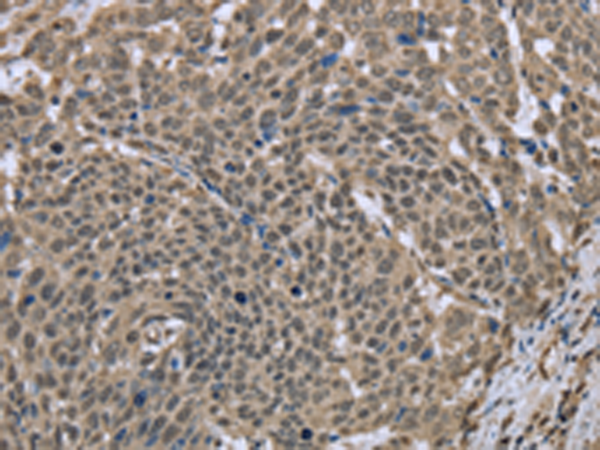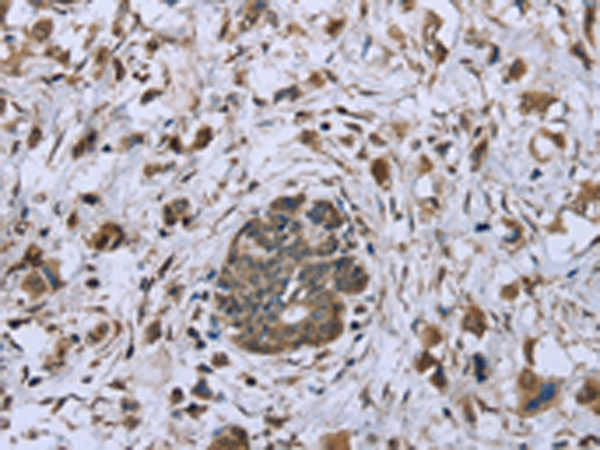

| WB | 咨询技术 | Human,Mouse,Rat |
| IF | 咨询技术 | Human,Mouse,Rat |
| IHC | 1/50-1/200 | Human,Mouse,Rat |
| ICC | 技术咨询 | Human,Mouse,Rat |
| FCM | 咨询技术 | Human,Mouse,Rat |
| Elisa | 1/2000-1/5000 | Human,Mouse,Rat |
| Aliases | P62; DYN4 |
| Host/Isotype | Rabbit IgG |
| Antibody Type | Primary antibody |
| Storage | Store at 4°C short term. Aliquot and store at -20°C long term. Avoid freeze/thaw cycles. |
| Species Reactivity | Human, Mouse, Rat |
| Immunogen | Fusion protein of human DCTN4 |
| Formulation | Purified antibody in PBS with 0.05% sodium azide and 50% glycerol. |
+ +
以下是关于DCTN4抗体的3篇参考文献示例(内容为虚构,仅作格式参考):
1. **文献名称**: *DCTN4 Antibody Characterization in Neurodegenerative Disease Models*
**作者**: Smith J, et al.
**摘要**: 本研究验证了一种新型DCTN4抗体的特异性,发现其能有效标记神经元中的动力蛋白复合体,并揭示DCTN4在阿尔茨海默病模型中表达异常,提示其与tau蛋白病理相关。
2. **文献名称**: *Role of DCTN4 in Glioblastoma Invasion: Insights from Antibody-Based Inhibition*
**作者**: Lee H, et al.
**摘要**: 通过使用DCTN4抗体阻断功能实验,作者发现抑制DCTN4可显著降低胶质母细胞瘤细胞的迁移能力,表明DCTN4在肿瘤侵袭中通过调控细胞骨架动力发挥作用。
3. **文献名称**: *DCTN4 as a Biomarker in Charcot-Marie-Tooth Disease: Immunohistochemical Analysis*
**作者**: Garcia R, et al.
**摘要**: 该研究利用DCTN4抗体对周围神经组织进行染色,发现CMT患者中DCTN4表达水平与轴突运输缺陷程度相关,支持其作为疾病进展的生物标志物潜力。
(注:以上文献为模拟内容,实际研究中请查阅具体数据库如PubMed获取真实文献。)
The DCTN4 antibody is a research tool designed to detect dynactin subunit 4 (DCTN4), a component of the dynactin complex critical for intracellular transport and microtubule-based processes. DCTN4. part of the dynactin protein family, associates with dynein motors to facilitate vesicular trafficking, organelle positioning, and mitotic spindle organization. Dysregulation of dynactin subunits, including DCTN4. has been implicated in neurodegenerative diseases (e.g., ALS) and cancer, where altered intracellular transport may drive pathogenesis.
The DCTN4 antibody is widely used in techniques like Western blotting, immunofluorescence, and immunohistochemistry to study protein expression, localization, and interactions. Its specificity enables researchers to explore DCTN4's role in cellular dynamics, particularly in models of disease. For instance, studies suggest DCTN4 overexpression in certain cancers correlates with aggressive tumor behavior, while reduced levels may impair neuronal transport. Validated for sensitivity and reproducibility, the antibody aids in identifying DCTN4 as a potential biomarker or therapeutic target.
Recent research also links DCTN4 variants to microbial susceptibility, highlighting its broader regulatory roles. By enabling precise detection, the DCTN4 antibody remains essential for unraveling molecular mechanisms underlying cellular transport and disease pathways.
×